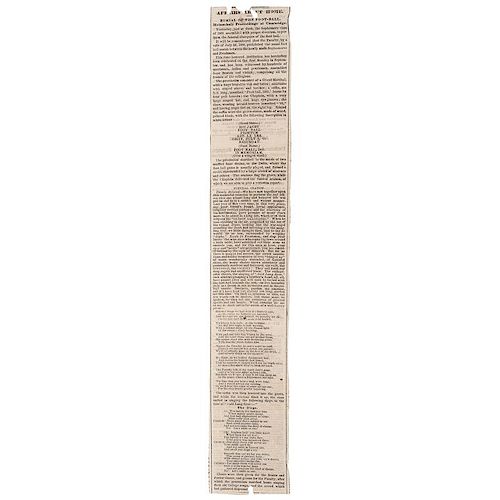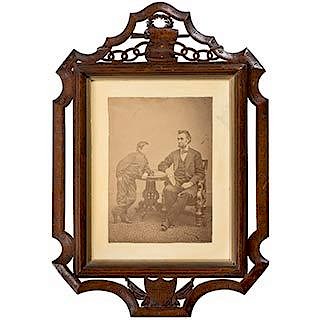Harvard Football Imprint 1860
About Seller
6270 Este Ave.
Cincinnati , OH 45232
United States
With offices in Cincinnati, Cleveland and Denver, Cowan’s holds over 40 auctions each year, with annual sales exceeding $16M. We reach buyers around the globe, and take pride in our reputation for integrity, customer service and great results. A full-service house, Cowan’s Auctions specializes in Am...Read more
Two ways to bid:
- Leave a max absentee bid and the platform will bid on your behalf up to your maximum bid during the live auction.
- Bid live during the auction and your bids will be submitted real-time to the auctioneer.
Bid Increments
| Price | Bid Increment |
|---|---|
| $0 | $25 |
| $500 | $50 |
| $1,000 | $100 |
| $2,000 | $250 |
| $5,000 | $500 |
| $10,000 | $1,000 |
| $20,000 | $2,500 |
| $50,000 | $5,000 |
| $100,000 | $10,000 |
About Auction
Sep 8, 2017 - Sep 9, 2017
Cowan's Auctions dawnie@cowans.com
- Lot Description
Lot of 3 items illuminating a unique event occurring during the developing years of American style football.
Newsclipping from unidentified paper describing Harvard's ban on the traditional "Bloody Monday" football game and the ensuing student response, with headline "Burial of the Foot-Ball. Melancholy Proceedings at Cambridge." Approx. 2.25 x 13.75 in., ca 1860.
Also included is a small document, approx. 5 x 7.5 in., printed with the lyrics to the "dirge" sung by the classmen as part of their football burial ceremony.
A final document, partially printed, 7.5 x 5 in., is a receipt indicating that "Mr. E. H. Kidder" has paid his bill for the second term ending July 18, 1860. The bill, including instruction, rent, fuel, gas, and other services, totals $37.10. Edward Hartwell Kidder (1840-1921), Harvard class of 1863, was a sophomore when the "Bloody Monday" game was banned.
Harvard's "Bloody Monday" game was a typical "mob football" style event which started in 1827. Traditionally played on the first Monday of the new school term, the infamous "Bloody Monday" game was a competition between members of the new Freshman and Sophomore classes. "Mob football" was a precursor to today's popular American football game. Featuring huge numbers of players trying to advance a ball into a goal area often by any means necessary, the brutal play and lack of rules associated with the game meant that injury and sometimes violence were common. This led a number of schools to ban the game including Harvard whose faculty voted on July 2, 1860, to prohibit the annual football game.
Partly in protest and partly in jest, students organized a funeral to bury a football and it is this event which is described in detail in the newsclipping. "The procession consisted of a Grand Marshal, with a huge bearskin cap and baton; assistants with craped staves and torches; a coffin, six feet long, inscribed 'Foot-ball, 1860,' borne by four pall bearers...Behind the coffin were the grave-stones, made of wood, painted black...The procession marched to the music of two muffled bass drums, to the Delta, where the foot ball game is usually played, and formed a circle, surrounded by a large crowd of students and others. The sextons dug the grave, while the chaplain delivered the funeral oration..." The article then provides the full text of the oration as well as the the text of the dirge sung to the tune of "Auld Lang Syne." This exact same text is printed on one of the accompanying documents.
Condition
Newspaper article has been cut from original paper, and is creased in some places. Chipping on the top edge line affecting the top line of text. Minor loss on bottom edge line affecting last word of text. Two small spots on article.
Other two items in good condition.
- Shipping Info
-
SHIPPING. At the request of the buyer, Cowan's will authorize the shipment of purchased items. Shipments usually occur within two weeks after payment has been received. Shipment is generally made via UPS Ground service. Unless buyer gives special instructions, the shipping method shall be at the sole discretion of Cowan's Auctions, Inc.. Cowan's is in no way responsible for the acts or omissions of independent handlers, packers or shippers of purchased items or for any loss, damage or delay from the packing or shipping of any property.
Eliminate the Hassle of Third-Party Shippers: Let Cowan's Ship Directly To You!If you'd like a shipping estimate before the auction, contact Cowan's in-house shipping department at shipping@cowans.com or 513.871.1670 x219
-
- Buyer's Premium



 EUR
EUR CAD
CAD AUD
AUD GBP
GBP MXN
MXN HKD
HKD CNY
CNY MYR
MYR SEK
SEK SGD
SGD CHF
CHF THB
THB











